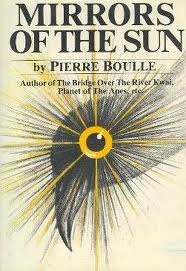This is part of a series on French author Pierre Boulle.
 Flammarion, 1982
Flammarion, 1982
translated by Patricia Wolf
Vanguard Press, 1986
183 pages
The novel’s original title, Miroitements, means “shimmer,” which better reflects (pun intended) the core of this story: that something bright and shiny may actually be a dangerous distraction.
As in The Good Leviathan, Boulle takes up one of the major environmental issues that, even in the 1970s and 80s, stirred up controversies and heated arguments among environmentalists and their opponents. While Leviathan explored questions surrounding nuclear power and oil, Mirrors of the Sun focuses on solar energy and its many potential benefits. Here, France has elected its first self-proclaimed “ecologist president,” whose main goal (to the detriment of the country’s other problems) is to build the most glorious solar power plant ever conceived of by humans. If that sounds a bit dramatic, you’re right–President Blondeau is not just excited to build this plant, or even jubilant. He’s practically rapturous about it. Indeed, Boulle uses words like “rapture,” “prayer,” “divine,” and other religious terms to describe the feelings of Blondeau, his wife, and their government ministers when they finally see Helios (the power plant) in action for the first time. The sun-worship, though, had begun even on the campaign trail:
The French people were fed up with politics and dreary debates on the responsibilities of government and fiscal stability. They were ready for the age of ecology. Eager for light and for an orderly arrangement of their planet, they embraced Blondeau’s cult of the sun as the symbol of these virtues. Thanks to the candidate’s natural eloquence and some impressive demonstration models … presented on television, the public gradually came to adore the sun, the new god, the one power capable of putting to flight the dark demons of industrial society. (49-50)
The Helios plant opens to great fanfare and the newly-elected president is ecstatic. Acres and acres and acres of “heliostats” have been constructed in a particularly sun-filled area of Provence, and things seem great. But remember: this is Boulle, so we can see the train wreck coming a mile away. How that wreck will happen, though, is what keeps us reading.
The first hint that things aren‘t great comes just as the plant starts really gearing up. Multiple species of birds, attracted to the mirrors, start flying around, entranced by the shimmering light and their own reflections. One quite distracted bird gets too close to a boiler and falls dead. Only one of the ministers sees this happen, and though he doesn’t mention it to anyone, he senses that it’s just the first in a series of ecological disasters.
Not surprisingly, more and more birds start hanging around the solar plant, soiling the mirrors with their waste, casting shadows, dropping insect carcasses, and generally screwing up the awesomeness that is Helios. That’s a problem, but an even bigger problem comes when the fishermen and fishmongers in the area start noticing that the water is looking gross and fish are floating around dead with pink spots on their bodies. It turns out that the detergents the plant has been using to clean the mirrors are polluting the area’s waterways.
And if that’s not bad enough, the birds are becoming a serious problem, so after much arguing and brain-wracking, the president and his advisers decide that it must be done: the birds must be exterminated. Poachers are encouraged and even paid by the government to shoot as many birds as they can, and poison is placed in areas where birds tend to eat. This wholesale slaughter of the area’s multiple bird species breeds another problem: now the insects are taking over. Without birds eating them, various insects are now soiling and shading the mirrors, leading to a massive reduction in energy output, just as the plant was starting to generate its own energy. What to do? Again the president hems and haws and wails and whines and ultimately agrees with his advisers: the insects have to go. After all, the amount of detergent that has to be used just to clean the bugs off of the mirrors is astronomical.
I think you can see where this is going. The extermination of the bird population leads to an extermination of the bug population; the detergents that have been pouring into the waterways have killed off most of the fish, which means that much of the wildlife has either died or fled. The humans who rely on the fish and animals must then decide if they want to leave the area or work as mirror-washers at the plant (many choose the latter).
The Blondeau government does its best to cover up all of this ecological destruction, but the mass slaughter disgusts one minister so much that he resigns and organizes an opposition party to promote nuclear power over solar. Helios turns out to have been a more destructive, more expensive, more destabilizing presence than anyone had imagined. Blondeau becomes so distraught by the devastation that he allowed in the name of the solar plant that he comes to a tragic end.
Once again, Boulle takes what seems like a great idea to its logical conclusion. Nothing, he suggests, is the solution to oppressive industrial work, environmental damage, and the continuous demand for energy. Putting faith in a single kind of plant can produce more problems than it solves.
